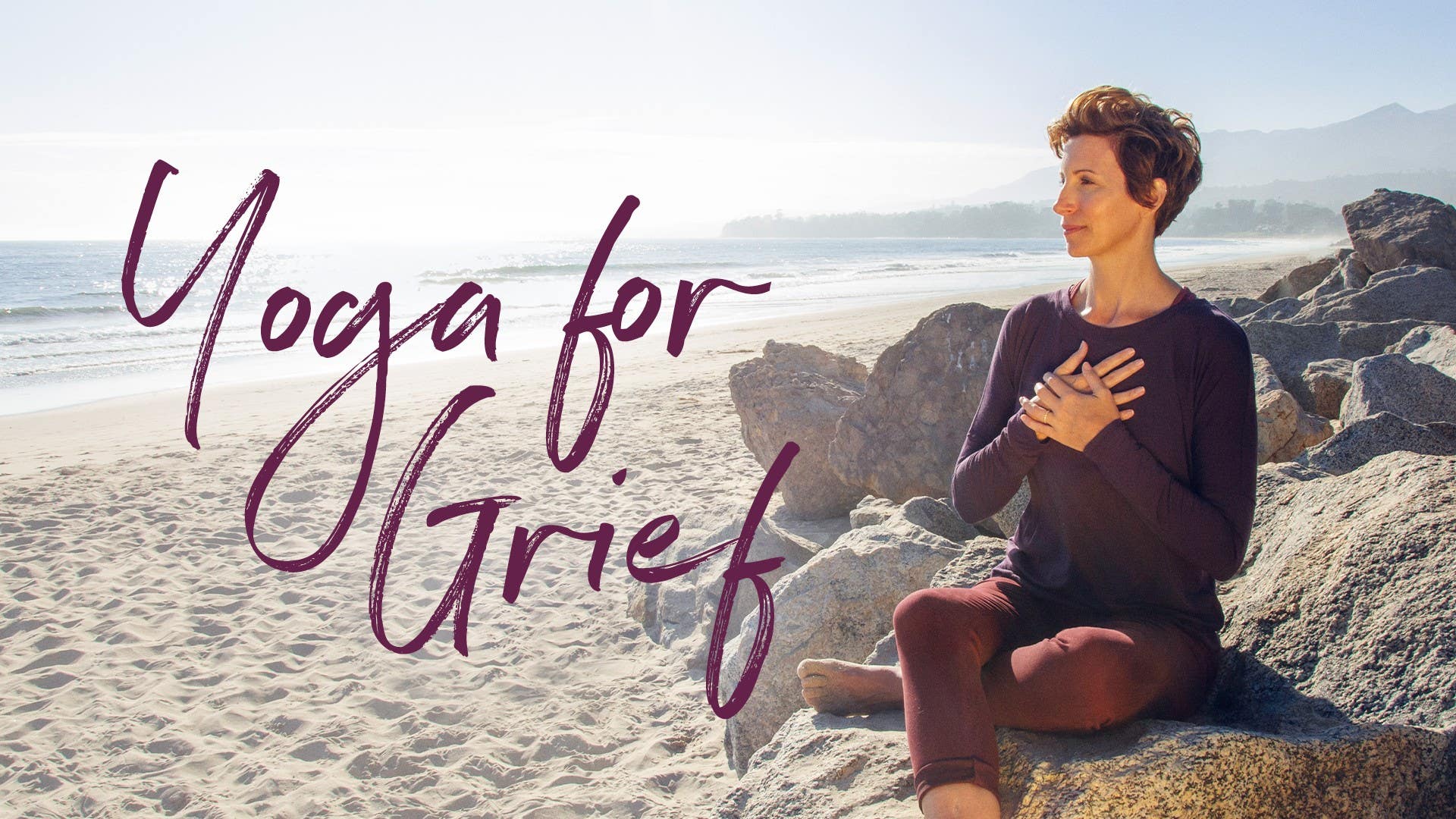Description
You may also be interested in this article on The Unexpected Symptoms of Grief.
About This Video
Transcript
Read Full Transcript
Chapter 1
Grief-Iversaries
Grief-a-versaries are my word for dates that can be really charged. Birthdays, appointment dates, death dates, other types of anniversaries, just days that we have on the calendar or in our minds that we look at and we know might be difficult. So let's talk about a few ways to navigate those dates. First, call in your support. Call in your support team. So that might be a friend that you know really gets you, might be working with a therapist, it might be your protective angels and guides, it might be meaningful objects.
It doesn't matter what it is as long as it works and feels supportive to you. Second, and this ties in, is to tell people or tell the person you want to know about this date that it's coming. So you can set some expectations, you can tell people, this date is coming, I might be more sensitive or emotional during this time, I might need more hugs from you, I'd really like a card or I'd like you to plan a dinner. Just letting people know so they don't have to guess, people don't know what's going on for you, so just simply letting them know. And third, you might want to plan something.
So this doesn't have to be elaborate or it could, it could be just planning for yourself a moment on that day, it could be writing a letter, it could be planting something in the yard, making a special meal, getting out in nature, or it could be a full ceremony. Again, the thing isn't as important as the meaning it has for you. So the big secret about these dates is that oftentimes the build up and the anticipation and the dread is so much worse than the actual day itself once it comes. So knowing that might give you a little more space around the emotions that come with that anticipation. So letting yourself flow, letting it be fluid, and really calling on the support that you have to help you through these times.
Chapter 2
The Ambush
So I have a term for the times when it feels like a grief trigger sort of jumps out of the bushes and it's called the ambush. And this is when you're a little further along in your grief journey, maybe you're back at work, you are socializing with friends now and then, you're going to the store. Life is feeling a little bit more regular on the outside, even though it might not feel normal or the same. You'll never be the old you, but you're out in the world. And then out of nowhere, maybe you're at the grocery store.
And this perfect moment of the song comes on the loudspeakers and you see the couple and they're buying cookies and they remind you of something and all of these things come together that trigger something, unleash, unlock something in you and suddenly you're crying in the produce section. So this is what I call the ambush. It's out of nowhere. This thing reminds you and suddenly you're back in that really intense grief place. Here are a couple of ideas.
One, go to your emotional safe place. So that might be calling a friend that you can talk to. That might be getting on a forum if that's something that you have available to you. It might be writing or going out in nature, just going to the place that gives you a sense of safety and support. Two, basic self-care.
Drink some water, eat some good food, get some rest. If you can take an hour or the rest of the day just to be quiet and kind to yourself. I know it sounds simple but when we take care of our physical bodies then we're able to let the emotional states and the mental states that are there flow more easily. Really, I think the biggest thing that can help here is knowing that these ambushes are going to happen. It's going to come up and it's totally normal.
We can get stuck in this, I thought I was so much better and I've regressed or now I'll always feel bad again. It's just not true. It's waves and the waves will come and the waves will pass. So knowing that you might get ambushed and having a plan, giving yourself some space and permission will really help when it happens.
Chapter 3
The Holidays
Let's talk about the holidays.
So A1, first order of business within family or group where someone is now no longer there, is to start communicating. And that can be really hard because it might be the last thing anybody wants to bring up. It might be that you're all just trying to manage and get through the day and to bring it up feels like that would make it even harder. But when we start communicating, we can say, this is how I feel, this is what I fear, this is what I hope. How about you?
It's really important to just name the elephant in the room. When we start communicating, it can reveal hidden expectations and hidden expectations are the most dangerous ones. We might expect that everything will be the same, everything will be okay and we have to make it look just like it looked last year. Or we might expect that it's going to be terrible no matter what. When we talk about these things, then again, we can just get to know where we're each coming from and be more open to being creative, working together.
We can also feel less alone in our grief. The other thing about holidays are traditions. So if you have traditions that were based around the person who's no longer there, there are some questions to answer. Will you continue that tradition of making the dish or decorating the home or getting supplies? If you will continue that tradition, who will take it?
Will you introduce new traditions? Maybe you want to start bringing in some new family way to celebrate. And lastly, to consider some way that you might want to acknowledge a person who's no longer there. Do you want to make their favorite dish? Do you want to have a special toast?
This is often where people will talk about the empty chair and acknowledgement of that person. So coming up with something as a group can really help everybody feel more connected to each other, to the holiday, and to the person that they're missing.
Chapter 4
Parties
The first thing to know about parties is that you don't have to go. You don't have to go to any event, any gathering, unless you really, really want to, no matter how important it is to other people. Especially in the early days, it can feel like, I should show up, I want to show everyone that I'm okay, and you just don't have to.
You don't even have to have a reason. If you do decide that you want to go, here are four things that you might consider to support you. First, go into the event or the party resourced. One of my favorite ways is what I call snow globe meditation, where I'll just picture, I'm a really visual person, so I'll picture that I'm inside a snow globe, and that is my protective, safe, loving barrier. It's a boundary.
My space is my own. You can even get fancy. Sometimes I will fortify my barrier with 24 karat gold, or I will imagine a powerful animal protecting my boundary, so you can get really crafty and make it meaningful for you. The second thing is to have an exit route. This can start with your RSVP.
You might say, thanks so much for the invite. I can be there for an hour, and it sets the expectation. If you go with someone, have a conversation with that person, so you might agree that you'll check in 30 minutes after you arrive and feel into how you are if you want to stay or if you want to have another check-in in 30 minutes or if you're ready to leave. You can also have that other person initiate the departure so you don't have to do it. If you're there alone, just know that you can leave whenever you're ready, and again, setting that expectation early can really help.
The third area is to know that the bathroom is your friend. You can excuse yourself to the bathroom at any time if you feel overwhelmed or you just need a moment. You can be alone. It's quiet. You can gather yourself.
You could practice any of the SOS tools that are covered in the SOS videos if you need to. It's just a break. No one will notice if you go there a few times. So the fourth thing to consider is to use a symbol, and that could be a talisman, something of meaning to you. It could be a special piece of clothing, jewelry, a fragrance, anything that helps you feel like yourself, that helps you feel grounded.
It could even be something that helps you connect to your person. A lot of people will use like a worry stone that you can keep in your pocket, just something tactile. It can be anything at all, anything symbolic that helps and has meaning for you. It's important to remember that your people are conflicted. They love you, and they don't know what to say.
They don't want to bring it up. They don't want to upset you. Or they want to talk about it, and you're like, I just want a break. So it's so hard. It's really challenging for you, for the ones who love you, lots and lots of permission and self-love and forgiveness.
Give yourself boundaries. Give yourself ways to tether and help yourself let things flow.
Chapter 5
The Myth of Closure
There is no such thing as closure. There is no moving on and letting go, releasing one last time. This is something really common that comes up in grief, and often I think we feel pressured to do so, to move on and let that person go so that you can start your life or start this new life.
And it's just not a real thing. That doesn't happen. The person died, but the relationship doesn't die. That relationship continues. It changes, but it continues.
And our invitation in grief is to find ways to integrate, to find ways to live with that loss. Not to completely get over it and move on. So there's no need for closure.
Yoga for Grief: Michelle Marlahan
Comments

You need to be a subscriber to post a comment.
Please Log In or Create an Account to start your free trial.









